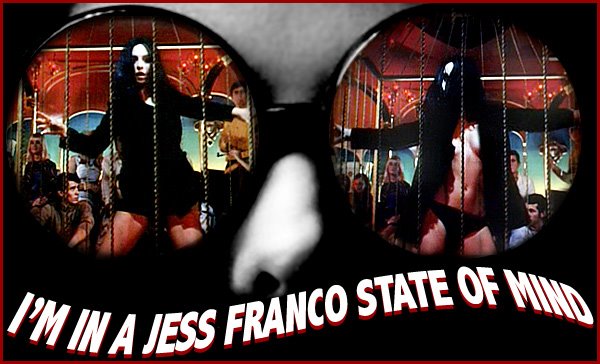
VENUS IN FURS red room

TWIN PEAKS-THE RETURN red room
Two things: Can there please be a Blu-ray release of Jess Franco's VENUS IN FURS asap? After seeing PAROXISMUS (...puo una morta rivivere per amore?), the alternate Italian version, credited to Hans Bilian, edited by Bruno Mattei, I wondered and still wonder if that version is closer to what Jess Franco intended, as a Noir style fever dream, than the more familiar cut, which was post-produced without the director's final input, although Jess told me he did supervise a cut, but not the one in general release. Nor have I seem the reported 90m, as opposed to the 86 m BU DVD, German version, VENUS IM PELZ.
Also, the more I see of David Lynch's new TWIN PEAKS television series, and reviewing the feature TWIN PEAKS FIRE WALK WITH ME, I see some interesting similarities with Franco in general and VENUS IN FURS specifically, especially the scenes in the red curtained, zig zagged floored Black Lodge. Red is the primary symbolic color in both feature films and overwhelms all other hues.
Try watching TPFWWM back to back with Franco's 1973 father-daughter incest drama AL OTRO LADO DEL ESPEJO, the similarities may be coincidental, but they are there in terms of imagery, mirrors being a portal to the truth and other worlds in both, for instance. Both Franco and Lynch employ surrealist imagery to tell their tragic stories of young women destroyed by their fathers.
And an English friendly HD release of AL OTRO LADO DEL ESPEJO is needed. It's also one of Jess Franco's key works. More on this in a future blog posting...
Emma Cohen entering the mirror in AL OTRO LADO DEL ESPEJO (1973)

Laura Palmer in the mirror: TWIN PEAKS

TWIN PEAKS FIRE WALK WITH ME..
PAROXISMUS: I wanted to express my own personal reactions to this cut. Rather than a VIDEO WATCHDOG style comparison between this Italian version and the VIF we all know I plan do an ogoing series of shorter blogs on various aspects of both cuts, with some specific comparisons to come. First, the music. There was a fascinating online interview with Mike Hugg about his memories of composing and producing the music track for the original VENUS IN FURS, which unfortunately has been deleted.
Maria Rohm as the object of desire in PAROXISMUS... PUO UNA MORTA RIVIVERE PER AMORE?
First and foremos,t BLACK ANGEL, as Jess envisioned it, was a love story steeped in the realm of jazz. Directly inspired by Chet Baker's observation that his own playing often transported him into a transcendent place. That element remains central in both versions.
Hugg states that he wrote the songs and the instrumentals were composed by him and Manfred Mann. But a lot of the music in the American cut came from other places, including US television, Stu Phillips library tracks, and cues from the score of the 1966 German made Jerry Cotton feature, THE TRAP SNAPS SHUT AT MIDNIGHT. S
till other unidentified music is in the Italian version. I'm going to retry to locate the interview and publish a link if possible.
The film has always struck me as a unique musical-horror-fantasy on the themes of love and death. In a way all Jess Franco's films could be considered musicals, and he has described himself as a musician who makes films.
Manfred Mann, the popular Rock group which had a number of hit records in the mid 1960s before working on the soundtrack for VENUS IN FURS. They also appear performing their music in the film.
Stay tuned for further information and commentary on PAROXISMUS, hopefully along with a review of the eventual Blu-ray release of VENUS IN FURS It would be really interesting to have this alternate version as a special feature on an upcoming Blu-ray.
Updated (C) Robert Monell 7/17








